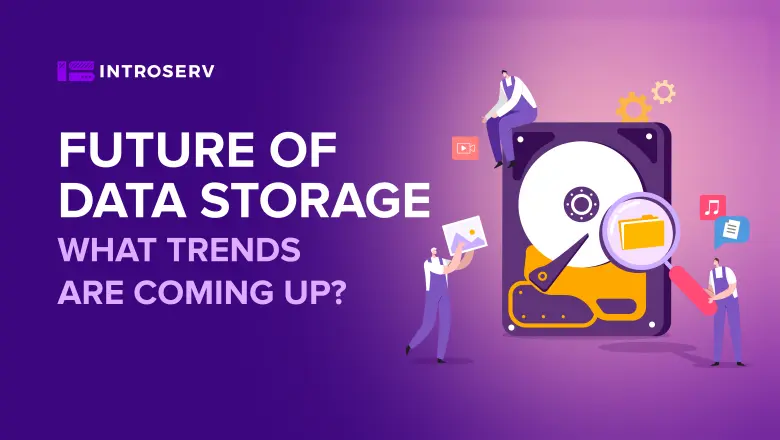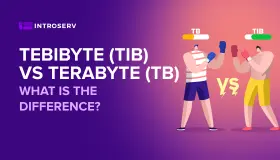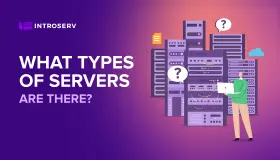
Future of Data Storage: What trends are coming up?
The digital economy has ushered in an era of unprecedented data growth, and the importance of data storage cannot be overstated. According to IDC, by 2025, the world will need to store a colossal 175 zettabytes (ZB) of data, which is tantamount to 175 billion terabytes (TB) or a mind-boggling 175 million petabytes (PB) or 1.5916157281026⋅10+14 TiB. To put this staggering amount of data into perspective, one PB can contain about 13.3 years of HD video, and one ZB can store about 36 million years of HD video. Can you even fathom the magnitude of this data volume?
As data storage demands continue to surge, the quest for efficient, secure, and cost-effective storage solutions is more critical than ever. Fortunately, emerging technologies and trends in data storage hold the promise of meeting this demand. In this article, we'll take a deep dive into the latest and most promising data storage technologies and explore how they can shape the future of information storage. So, let's get started.
Cloud Storage
Cloud storage has revolutionized the way we store and access intelligence. It allows businesses and individuals to store their facts and figures on remote servers, accessible from anywhere with an internet connection. Cloud-based information storage has become more secure, scalable, and accessible due to the growth of cloud computing. This technology has enabled efficient and secure knowledge management, making it a game-changer for the digital economy.
Virtual-based storage is predicted to become more popular, especially with the rise of big data and the Internet of Things (IoT). With cloud information keeping, businesses and individuals can enjoy scalable and robust digital archives, capable of storing vast amounts of inputs.
The future of cloud-based database management is also expected to be more secure, with the use of robust encryption and information protection mechanisms. These measures will ensure that sensitive details remain protected from unauthorized access and cyber threats, boosting confidence in cloud-based information repositories.
Another exciting development in the future of cloud storage is its increasing affordability. As cloud services become more cost-effective, businesses and individuals will be able to manage their information more affordably.
SSD Data Reduction
SSD information minimization can significantly decrease the amount of memory needed for file storage. Compression and deduplication work together to maximize information management efficiency, making it possible to keep more data in the same amount of space.
Compression involves analyzing information and identifying patterns that can be replaced with smaller representations of those patterns. Deduplication, on the other hand, is about identifying and eliminating duplicate intelligence from an archival system. This technique ensures that knowledge is not unnecessarily duplicated, which can save considerable file storage space.
When applied together, these techniques can help reduce the amount of memory required for stats on an SSD by up to a whopping 90%! This revolutionary approach to information storage has significant implications for organizations, particularly those with large-scale information management needs.
Data Security
Encryption technology has become an indispensable part of data security in recent years. It is a process that converts data into an unreadable form, which can only be decrypted using the right key. With the ever-increasing amount of data stored and transmitted electronically, encryption has become a critical tool to protect data from unauthorized access.
But encryption is not the only trend in data storage security. Blockchain technology is another promising approach. It is a secure, transparent, and decentralized ledger that can store and verify data. Using blockchain, companies can create a tamper-resistant and immutable record of their transactions, reducing the risk of fraud, data breaches, and other security threats.
Artificial intelligence (AI) and machine learning (ML) also have enormous potential to detect and prevent cyber threats. These technologies can analyze vast amounts of data in real-time, detecting anomalies that may indicate a potential security breach. Furthermore, AI and ML can be used to automate threat detection and response, reducing the time it takes to identify and mitigate security threats.
In the future, encryption technology is expected to become more advanced and robust, making it even more challenging for cybercriminals to breach data security.
AI and Machine Learning
In the realm of information retention, artificial intelligence, and machine learning are revolutionizing the way we handle, safeguard, and restore information. These technologies are being integrated into storage management systems to create smart archival systems that can automate tasks and optimize data placement.
Concerning the improvement of cyber security in storage systems, neural networks can also help in identifying sensitive inputs, classifying them based on their level of confidentiality, and applying appropriate security measures to safeguard them.
Data recovery is another field that AI and ML are transforming in data storage. The ability to retrieve records quickly and accurately can make a significant difference in an organization's operations. By using smart machines and deep learning, you can expect to reduce the time and effort required to restore knowledge in the event of a system failure.
Furthermore, artificial intelligence and machine learning are reducing the cost of information management by optimizing material placement and automating tasks. This increased efficiency leads to a reduction in the amount of storage space required, resulting in lower costs for storing and managing the intelligence.
DNA Data Storage
DNA information storage is a highly intriguing field of study that involves encoding digital information into DNA molecules for retention purposes. This technology has the potential to hold vast amounts of materials in a compact and resilient form, with a lifespan of thousands of years.
One of the most remarkable features of DNA information storage is its massive storage capacity. A mere gram of DNA can accommodate up to 215 petabytes of intelligence, equivalent to a whopping 215 million gigabytes. With such vast input capacity, the entirety of the world's digital content could fit into just a few pounds of DNA.
The durability of DNA data archives is another critical advantage, as it is resistant to degradation over time and can endure physical harm. DNA molecules can survive for thousands of years if appropriately preserved, making them the ideal solution for the long-term memory of crucial knowledge, like scientific research or cultural heritage.
Although DNA information repositories are still in their infancy, researchers are making significant progress in this field. Several institutions and companies are exploring its potential and finding ways to make it more affordable and accessible. In the future, we can expect DNA data storage to become an increasingly viable option for various applications, including cloud-based intelligence, high-performance computing, and record backup and archiving.
Object Storage
Object-based storage, a revolutionary approach to data storage, provides an innovative way to handle vast amounts of unstructured data with a high degree of scalability and cost-effectiveness.
Unlike traditional file and block-based storage systems, object storage functions by breaking data into individual objects and storing each object with its unique identifier. This provides quick and efficient access and retrieval of information. Furthermore, object storage allows for seamless data sharing and collaboration across multiple locations and platforms, making it an excellent option for businesses with distributed teams or partners.
With the rise of big data and IoT, there will be a staggering increase in unstructured intelligence that needs to be stored and analyzed. As businesses continue to generate more and more records, they require scalable, cost-effective, and efficient ways to store and manage that data. Object storage allows for the keeping of massive amounts of knowledge, making it the perfect fit for modern data handling needs.
Immutable Backups
Immutable backups are a type of backup that guarantees the permanence, immutability, and unalterability of information. This means that once information is backed up, it cannot be modified or deleted, thereby ensuring the integrity and security of the data.
No-change backups offer unparalleled security and peace of mind for businesses, as they provide a failsafe mechanism in the event of a primary data repository breach or compromise. Companies can rest assured that their intelligence will be protected against tampering, deletion, or loss.
In addition to their security benefits, unmodifiable backups are also cost-effective. By handling a single copy of the data, companies can save on storage expenses and optimize their resources.
As companies become more aware of the importance of data integrity and security, the demand for immutable backups is expected to grow exponentially. This technology provides an essential layer of protection against data breaches, data loss, and data corruption, making it a critical component of any comprehensive information-keeping strategy.
Better Data Storage with INTROSERV
At INTROSERV, we are committed to providing cutting-edge data storage solutions that meet our clients' needs. We offer a range of cloud-based storage solutions that are secure, scalable, and cost-effective. Our expert team is continually researching and developing new technologies to improve our services, and we are excited to be at the forefront of the future of data storage. Contact us today to learn more about our services and how we can help you manage your data more efficiently and securely.








